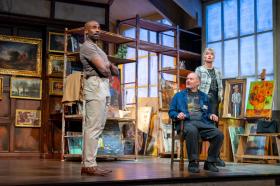The English countryside is not what is used to be. Undoubtedly, the Foot-and-Mouth (FMD) crisis accelerated a downturn in the already struggling agriculture industry, but while affected farmers received generous compensation, small businesses were among the hardest hit. Now, faced with the reality the rural industry might soon be a thing of the past, communities are feeling increasingly isolated from their urban peers as they struggle to come to terms with an uncertain future. The question now being asked is: Is what appeared to be on the surface an agricultural crisis, actually a deeper crisis of culture?
Ian Hunter is the Trust Project Developer of Littoral, an arts trust for social and environmental change. He is spearheading an arts initiative targeting the social, cultural and psychological issues impacting on rural communities. But it’s not just about supporting farmers and communities affected by FMD, it’s about bridging the yawning gap between urban and rural Britain.
‘In England especially, and the Government has recognised this, there’s a great gulf between rural and urban communities,’ Hunter explains. ‘You’ve got the dominant urban culture which is 98% of England. They have no idea what’s happening in the countryside,’ Hunter says.
‘What’s complicated this is the crisis in agriculture,’ Hunter continues. ‘There’s massive restructuring of agriculture and the rural economy – and it’s having very serious social, health and psychological consequences.’
The Arts Council of England has commissioned Littoral to draft a policy document for a new role for the arts in rural areas.
To test some of the ideas in the document, a series of conferences will be held in three areas with large rural and agricultural constituencies: Yorkshire, East Midlands and the South West.
The initiative, ‘Investing in Rural Creativity, The Arts and Agricultural Change,’ looks at new ways the arts can assist the transition process in rural communities.
‘Basically, it’s bringing urban arts groups to work with rural and farming communities,’ Hunter explains.
‘The overall name for the initiative, ‘Investing in Rural Creativity’, doesn’t just privilege the urban professionalised artist as being the ones who go into the countryside,’ he continues. ‘We’re also talking about rural women’s creativity, the creativity of farmers and rural businesses.’
‘And that’s also the bringing together of two cultural traditions. We actually talk about a reconciliation between the urban culture and the rural and farming cultures.’
A number of projects are already underway, including ‘Rural Diversities’, an initiative to raise awareness of racial issues through multi-cultural creative partnerships; ‘After FMD’, addressing problems of self-esteem and rebuilding social cohesion in communities badly affected by Foot and Mouth disease; and ‘Speaking Out’, a project for rural communities to have their voices heard through local radio and digital arts projects.
Hunter explains in developing and implementing arts projects, the whole concept of ‘rural’ had to be reframed.
The countryside is no longer an ‘authentic rural farming community’, but populated by a mix of retired professionals, small business owners, tenant farmers and some of the most privileged people in the country who own 90% of the nation.
As for agriculture, it only accounts for 0.7% of the GDP. Despite this, it receives £3 billion in CAP subsidies, accounting for 40% of farmers’ weekly incomes regardless of produce.
Meanwhile, the average annual agricultural income has dropped to £10,000, in the worst cases considerably lower, a figure well below the minimum wage.
But these issues have been somewhat overshadowed by other rural campaigns, like the lobby against the proposed ban on fox hunting.
Two weeks ago, the Countryside Alliance led a 400,000-strong march through central London to campaign against the ban and raise awareness about other rural issues.
But there was deep anger in the rural community, especially those who don’t support hunting, that once again the real issues were overlooked.
According to Patrick Wright, BBC Radio 3 arts presenter, academic and author of The Village that died for England, the decision to choose fox hunting as the theme to defend the countryside revealed political motivations.
‘The rise of the countryside lobby in the nineties, in the early years of the Labour Government, was pretty clearly linked to a conservative interest group realising they had no political representation any longer after a long period of links with the Tory party,’ Wright says.
Wright also warns, although the countryside needs to be defended there is the danger of supporting other political movements.
Before the march, the British National Party website urged its members to attend the march to spread its message for a ‘radicalised middle Britain,’ according to a Guardian report.
However, in response, the Countryside Alliance distanced itself from the issue emphasising members of the BNP were not welcome on the march.
‘The countryside anxieties are possibly linked to a great reluctance to accept that British culture is now racially mixed,’ Wright comments. ‘You notice the Countryside Alliance marching into London and they’re all white, and all white grouping in London these days looks very odd,’ he added.
‘The defense of the countryside is an element of an attack on the population of cities. That’s another reason why you can’t simply defend the country as a repository of pure values.
‘If you start defending the country and you end up on the side of the British National Party, something is going on you need to be aware of,’ Wright says.
Hunter and Wright both pointed to the same conclusion – to raise awareness about complex rural issues, artists should dramatise them.
‘As far as art is concerned and rural art,’ Hunter says, ‘because of the cultural complexity, the political nature of what’s happening, the social and health problems, the complex and seriousness of the economic problems, the issue of identity of the countryside, pressures from the environmental lobby, suicides in the farming communities, and government indecisions, the arts have an important role to play in assisting rural communities negotiate their future.’
The Littoral conference, Investing in Rural Creativity, the Arts, Agriculture and Change, will take place October 22-24, ABC Centre, Bakewell, Derbyshire. For further information, contact Littoral 01706 827 961 or littoral@btopenworld.com or visit the Littoral website
The updated version of Patrick Wright’s The Village that Died For England is out on Faber on November 4.




